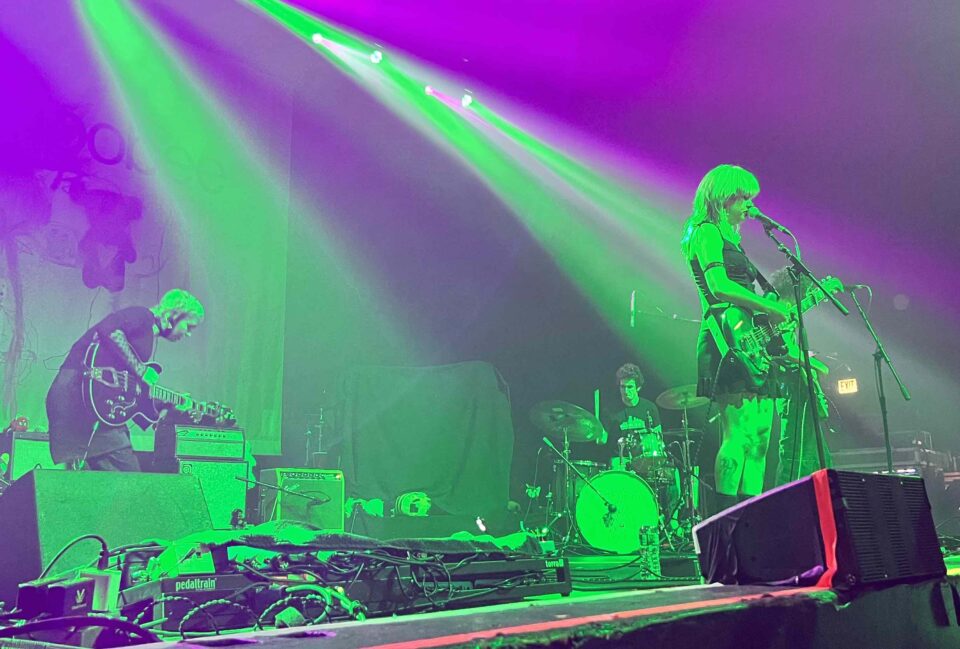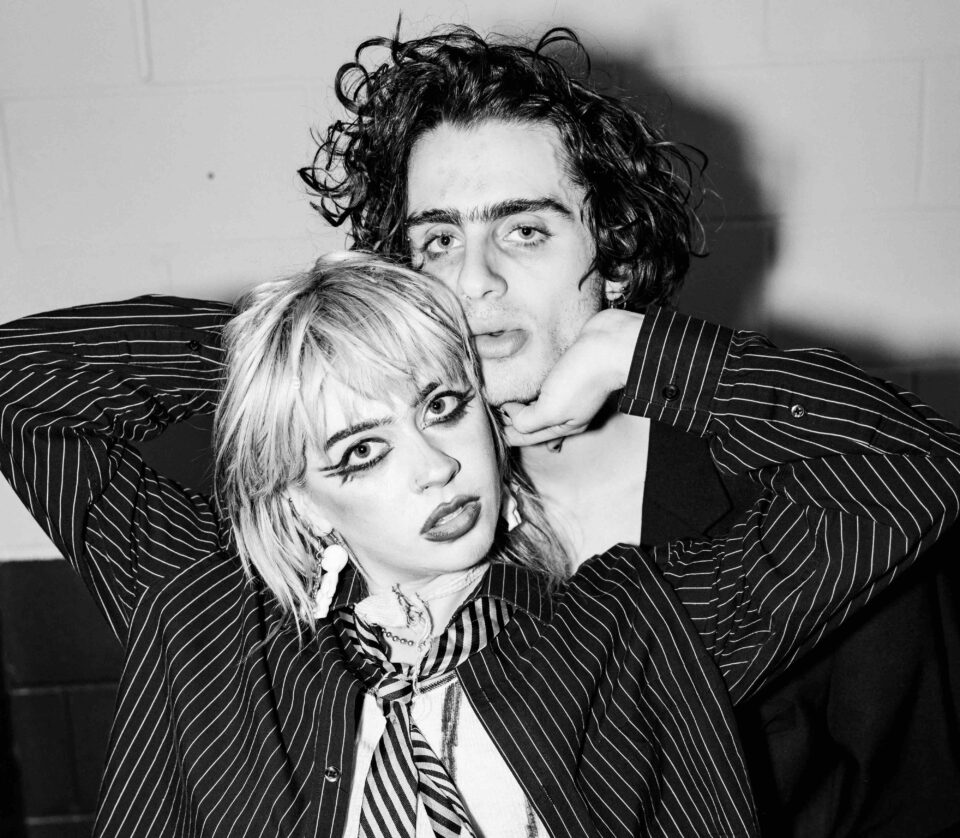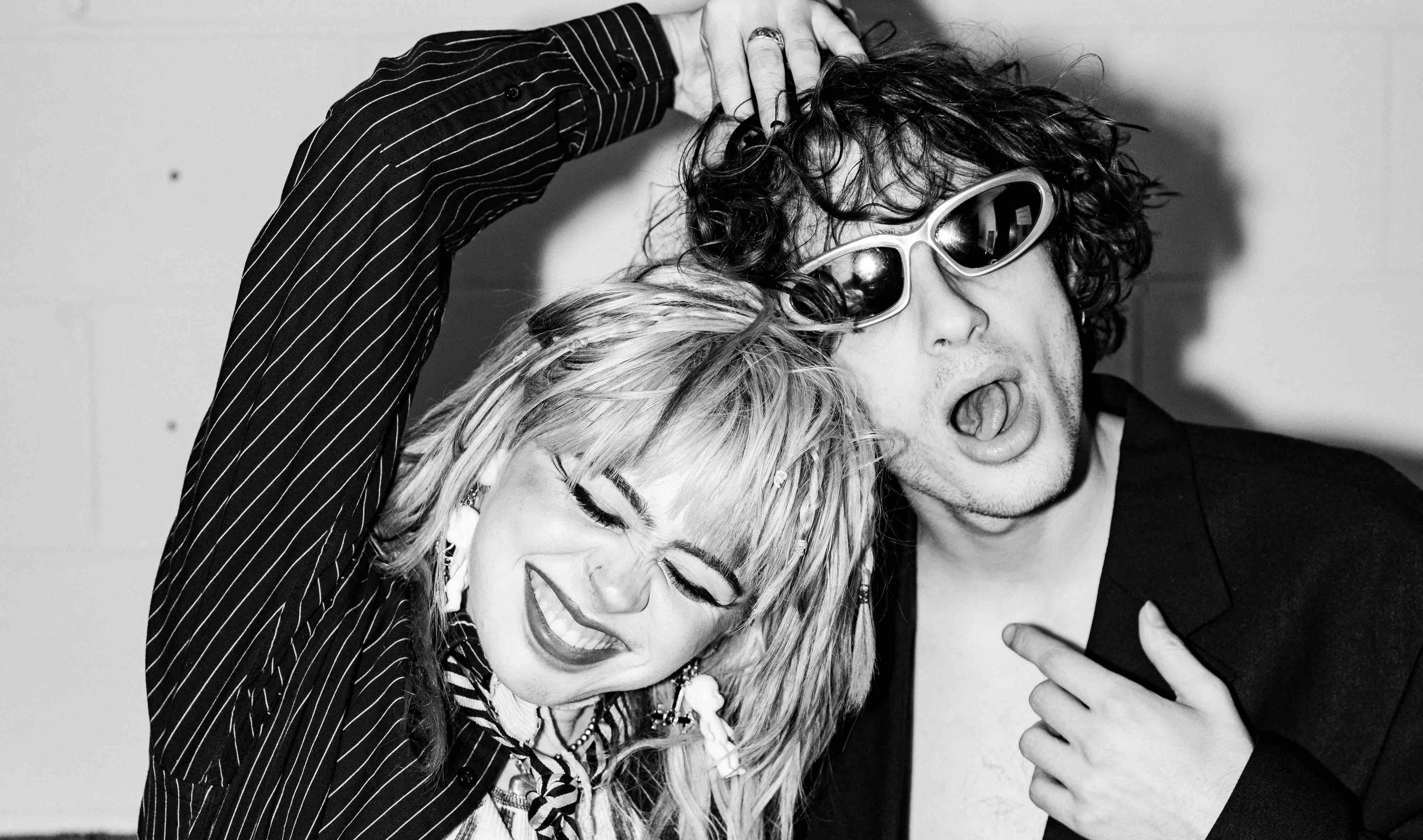Since their first release in 2018, Lowertown’s Olive Osby and Avsha Weinberg have been consistently sharing new music, including two EPs and a full-length since signing to Dirty Hit in 2020. Last March, they went on their first tour—and then two more (their latest tour is their biggest yet, opening for labelmate Beabadoobee). They’ve seemingly been in constant motion since their inception (including a relocation from their native Georgia to NYC and frequent trips between the US and London to record), revealing their proclivity for changing their sound—tender folk ballads, gnarled garage rock, piano-based waltzes—and contemplations about the bizzaro frustrations of getting older.
The duo writes about time’s passing with anguish and wistfulness in equal parts. Their music captures the hyper-awareness that the current generation is faced with once old enough to think for oneself. Early childhood feels like an Eden that we’re incapable of accessing, even though we know that ignorance once existed. Despite their music’s shifting temperaments, Lowertown’s compositions are built around surreal, sometimes cryptic imagery and emotional revelations. “I’m not old but old enough to know,” Osby sings on “Grass Stains” from 2021’s The Gaping Mouth EP. “That time goes by fast / But as a kid I remember it being slow.”
Their recent debut LP I Love to Lie approaches new life lessons in more nuanced ways, with vignettes of social vampirism disguised as friendship and black mold mirroring the state of relationships, all while taking on the slimy lizards running the music industry boardrooms. Their music’s rawness encapsulates the strange moments they’re currently caught in—not quite adults, not quite kids; they’re trying to figure themselves out and realizing that most people are only pretending they know.
Late last year, on their last week of tour, we met up with the duo backstage at their show in Chicago. The two sit side by side on a small black leather couch in the Riviera Theatre’s backstage area where they detail their last couple years since graduating high school, hanging out with an older crowd, and finding out personal truths in the process. “I was trying to just play it cool, trying to fit in,” Osby says about her experience moving to NYC. “I ended up meeting a lot of people—half of them were really cool and half of them were really shitty scumbags. A lot of the album was definitely inspired by shitty people being really horrible to us.”
Weinberg takes a different angle: “Our circle expanded so much where inevitably we’re gonna have some shitty people around us. I tend to blame myself for a lot of things, and that’s where my anger came from. But it was interesting because we both came to those conclusions in sort of tangential ways.”
Read on for more of our chat below.

I noticed on this album there’s a shift in vocal delivery from your earlier stuff. Some songs definitely have more aggressive vocals. Was that intentional?
Olive Osby: Recently I’ve become a lot more assertive. The idea of yelling and being loud was just something I couldn’t wrap my head around when we were recording the first projects. I think growing up, and also living in New York, made me angry. We started listening to a lot of punk music. So I think we felt naturally that we wanted to be louder.
Avsha Weinberg: I think the shift has definitely come with our environment. The only thing we’ve put out that hasn’t been impacted by where we choose to live would be [2019’s] Friends, because we made it when we were so young. But it definitely was impacted by our emotions. The most important thing about Lowertown as a project has been to portray exactly how we’re feeling in the time that we record.
“The idea of yelling and being loud was just something I couldn’t wrap my head around when we were recording the first projects. I think growing up, and also living in New York, made me angry.” Olive Osby
The album itself seems to have a progression from loud and enraged to soft and melancholic.
OO: A lot of the oldest songs on the record are the loud ones when we were living in New York, and a lot of the newest ones were when we were in London. So I feel like it just felt like a natural flow to start from the oldest and the loudest to go to where we were feeling at the time. The last one on the record is the newest one we wrote, and that just felt like such a natural closer to all the feelings on the record.
AW: I think we’re also very nostalgic and melancholic people, and when we think about the end of an era, we’re very bittersweet about it. The beginning is New York and London and then the end is like, “OK, this is the end of this time, it’s over.” I feel like we have an instrumental at the end of Friends as well. I think that’s how we feel like a complete circle—something that’s bittersweet and melancholic.
Are you full time musicians?
OO: Yes, right now. Which I’m hoping continues on, but it’s definitely been crazy because you have to be so self-disciplined. If we have a period of time where there’s nothing to do planned out, we get very in our heads. Like, “What is the point of anything? I need to do something.” So I guess that anxiety propels us. But it’s definitely been a long journey for me, because I don’t really know how to be a full-time musician quite yet. It’s sort of difficult.
AW: Specifically over this tour, I felt that I’ve become a lot more stoic with my responses to external things. I’m a lot more accepting of the fluidity of living. You grow up and you have a schedule and you have things you’re supposed to do. And it’s difficult to reach the point where you accept that things are never gonna go exactly how you want them to go.
OO: And if something goes wrong, it’s no one else’s fault but mine. That sucks. I have no one to blame it on. I think it’s weird, waking up and having no adult tell me what I should be doing. That’s definitely the biggest thing for me right now. It’s like trying to find ways to fill my time and feel valuable with it.
“The most important thing about Lowertown as a project has been to portray exactly how we’re feeling in the time that we record.” Avsha Weinberg
Do you guys feel like the age you are now?
Both: No, not at all.
OO: I think the reason we became friends in high school was because we’ve always been a bit more mature than our age group. And that’s been a bit isolating in a lot of ways. A lot of our experiences since we’ve graduated high school have made us mature a lot faster. It’s nice because we can take care of ourselves, but it also feels like a lot of pressure sometimes. I feel like our family and our label and people we work with are like, “You’re so old for your age, you can handle yourself.” And it’s like, half the time we’re just pretending. Most of the time I forget that I just turned 21. We’re good at pretending we know things, and people assume we can handle it. It gets really overwhelming sometimes.
AW: I’ve always hated being looked down on because I was young. I love solitude and I love being able to make my own decisions and stuff. It’s something that I’m still working on, because I think a lot of my decision making is impacted by the people around me. But I like being given the responsibility of figuring out myself. I don’t take other people’s responses or advice very well.

A major theme of this album is realizing everyone is putting on a performance. There’s a lot of distrust and skepticism. Are you guys still in that headspace?
OO: Oh, yeah! I feel like that so much right now on tour because I’m so not a performer. Both of us didn’t get into music to do performance stuff. Doing this for a month and a half has made me feel so crazy. I feel like half the time I’m being the most genuine version of myself, and half the time I’m like, “What am I doing right now? What am I saying? Am I doing everything just for everyone in the audience? Or is this me? And do I feel like this is actual artistic expression?”
I think a lot of tours have been like, “How much of yourself do you sacrifice because you know people are gonna like it more?” It’s a performance, and it’s supposed to be like that, but how do you also preserve yourself when you’re performing in front of people? That’s been my big thing, especially to an audience that isn’t ours. It’s [Beabadoobee’s] audience, so how do I curate our setlist and what we say to these people, but also stay true to Lowertown? But also without scaring them, because our music is scary and loud.
“A lot of tours have been like, ‘How much of yourself do you sacrifice because you know people are gonna like it more?’ How do you also preserve yourself when you’re performing in front of people?” Olive Osby
Are you presenting a different version of yourself than you would on your own bill?
OO: Definitely. Because they’re so young, a lot of them have never even been to a concert before. I feel like we have to direct them more. If we start off with a hard song, it catches them off guard. They don’t really know how to dance to harder music yet. I think it’s understanding that they may be enjoying it, they just don’t know how to respond to it sometimes.
AW: It’s just that constant question of, “How far can I go before before I completely separate it from—”
OO: “’Til I’m not myself anymore.” FL









